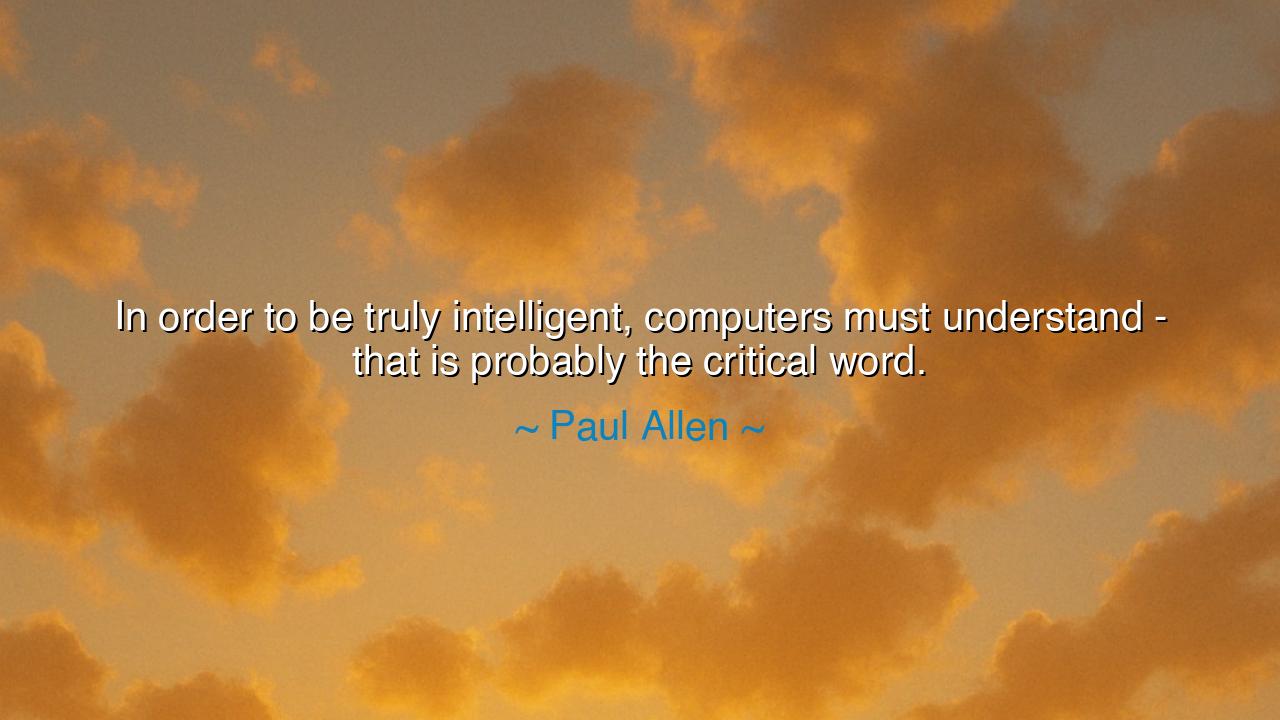
In order to be truly intelligent, computers must understand -
In order to be truly intelligent, computers must understand - that is probably the critical word.






“In order to be truly intelligent, computers must understand — that is probably the critical word.” — in these words, Paul Allen, co-founder of Microsoft and visionary of the digital age, pierces to the heart of one of the greatest questions of our time: What is intelligence? His reflection is not about machines alone, but about the essence of understanding itself — that deep, mysterious quality that separates mere calculation from consciousness, and information from wisdom. His statement stands as both prophecy and warning: the future of technology depends not only on how much a machine can think, but on whether it can truly understand.
Allen speaks from the vantage point of one who helped build the foundations of the modern digital world. He had seen computers grow from clumsy engines of arithmetic to vast systems capable of memory, speech, and simulation. Yet, even amid these marvels, he recognized a void — the absence of comprehension. A computer can process, analyze, and respond, but does it know what it is doing? Does it feel the weight of meaning behind its words? Allen saw that computation is not consciousness, and that until machines can bridge this gap — until they can understand — their intelligence remains a shadow imitation of the human mind.
To understand, in the truest sense, is not simply to store or retrieve knowledge, but to perceive its essence — to connect it with context, purpose, and emotion. The ancients would have called this wisdom, the union of intellect and insight. In this, Allen echoes the same distinction that Socrates drew when he spoke of those who “know many things but understand nothing.” The philosopher and the programmer stand upon the same frontier: the quest to transform information into meaning. It is a journey not of circuits, but of consciousness.
We might remember here the story of Alan Turing, the father of computer science. He imagined a world where machines could mimic human behavior so perfectly that no one could tell the difference. This was the birth of the Turing Test, a measure of imitation — but not of comprehension. A machine could pass the test by appearing to think, yet remain blind to its own words. Turing’s vision was brilliant, but even he knew its limits. As Paul Allen would later remind us, true intelligence cannot be reduced to performance. It requires understanding, that inner flame that allows meaning to arise from knowledge.
The danger Allen foresaw is not only that machines may fail to understand, but that humans may forget what understanding truly means. In a world where algorithms predict desires and data replaces discernment, we too risk mistaking knowledge for wisdom. The machine is our mirror: as we teach it to think, we must remember what it means to feel, to comprehend, to see beyond logic into truth. Allen’s warning is thus double-edged — not only a challenge to technology, but a call to humanity to guard the sanctity of understanding within itself.
And yet, his words also carry hope. For Paul Allen believed that understanding, though rare and profound, is not beyond reach — even for our creations. He envisioned a future where computers might one day grasp context, empathy, and purpose; where technology could aid humanity not merely by processing data, but by discerning meaning. But for that to happen, humanity must first teach machines not only how to think, but why to think — and for whose sake.
The lesson in Allen’s words is eternal: intelligence without understanding is empty, and understanding without purpose is blind. In every field — whether we build machines or live our daily lives — we must strive not only to know, but to comprehend. Seek the why behind the how, the meaning behind the mechanism. For understanding is not a luxury of the mind — it is the foundation of wisdom, the bridge between creation and conscience.
So remember, O thinker of the future — the world will be filled with knowledge, but understanding will always be rare. Cherish it. Cultivate it. Teach your machines, but never let them teach you to forget what it means to be human. For as Paul Allen reminds us, it is not the thinking that makes us intelligent — it is the understanding that makes us alive.






AAdministratorAdministrator
Welcome, honored guests. Please leave a comment, we will respond soon